Macau’s housing market is weakening
Macau’s housing market is now cooling rapidly. Slower economic growth in Mainland China and the civil unrest in Hong Kong are hitting Macau’s gaming and property sectors.
During the year to Q2 2019, the average transaction price of residential units in Macau rose by a modest 2.5% to MOP 110,263 (US$13,611) per square metre (sq. m), according to the Statistics and Census Service (DSEC). This was a sharp deceleration from the double-digit price increases from late-2016 to early-2018. When adjusted for inflation, prices fell slightly by 0.2%.
Figures from global real estate firm JLL showed that values of high-end and mass-to-medium residential properties in Macau fell by 3.5% and 1.8%, respectively, in H1 2019 from a year earlier.
Both demand and supply are plummeting. In H1 2019, residential property transactions in Macau fell by 38.6% y-o-y to 4,104 while transaction values plunged 42.1%.
Residential completions fell sharply by 92% to just 104 in H1 2019 compared to 1,251 in H1 2018. Similarly, residential permits dropped 86% to 134 in H1 2019 from 945 a year earlier.
Locally, residential property price movements are mixed.
- In Macau Peninsula, the historic center of Macau, the average transaction price of residential properties rose by 6.45% y-o-y to MOP 109,987 (US$13,577) per sq. m. in Q2 2019. However only 5 of the 17 areas where figures are available saw house price growth.
Fai Chi Kei registered the biggest house price increase in the island of 18.5% during the year to Q2 2019, followed by Horta Costa & Ouvidor Arriaga (16.3%), and NATAP (12.8%). In contrast, huge price falls were seen in Baixa de Macau (-17.22%), ZAPE (-15.78%), NAPE e Aterros da Baía da Praia Grande (-10.93%), Barra/Manduco (-10.52%), and Guia (-8.18%).
- In Taipa, where there are many hotels, casinos, and shopping malls and which is home to the Macau Jockey Club racecourse, residential property prices surged 12.43% to MOP 101,515 (US$12,531) per sq. m. during the year to Q2 2019. House prices rose in Cidade & Hipódromo da Taipa (33.39%), Jardins do Oceano e Taipa Pequena (13.86%), Baixa da Taipa (13.04%) and Universidade & Baía de Pac On (7%) but declined in Pac On & Taipa Grande (-6.39%).
- In Coloane, home to two of Macau’s best beaches - Cheoc Van and HacSa, residential property prices fell slightly by 0.3% y-o-y to MOP 128,871 (US$15,908) in Q2 2019.
NATAP, located in Macao Peninsula, has the most expensive housing, with an average transaction price of MOP 146,481 (US$18,082) per sq. m. in Q2 2019. Coloane has an average price of MOP 128,871 (US$15,908) per sq. m; Fai Chi Kei, MOP 119,410 (US$14,740) per sq. m.; Móng Há & Reservatório, MOP 118,886 (US$14,675) per sq. m.; and Cidade & Hipódromo da Taipa, MOP 117,755 (US$14,536) per sq. m.
Macau’s property market is expected to slow further in the coming months, as various local and global events have adversely impacted both domestic and foreign demand. The recent implementation of property speculation cooling measures in Macau, coupled with the ongoing US-China trade war, capital controls in China, and the civil unrest in Hong Kong, are now weighing on both the housing market and the wider economy.
Macau’s economy is expected to contract by 1.3% this year and by another 1.1% in 2020, following expansions of 9.7% in 2017 and 4.7% in 2018, based on IMF estimates.
New stamp duty tax introduced
The government introduced a new stamp duty tax in February 2018 to discourage speculative buying.
- Homebuyers purchasing a second unit are required to pay a stamp duty of 5%, and 10% when purchasing their third unit or more.
- Property tax exemptions for empty units has been abolished, in an effort to increase housing supply.
Macau’s amazing boom
Macau’s housing market generally follows its economy. Residential property prices skyrocketed by a total of 330% (233% in real terms) from 2010 to 2014, more than 14 times the rise in inflation, rising by double-digits every year, after a slight decrease of 0.3% (-1.5% in real terms) in 2009 due to the global crisis. The economy grew by an annual average of 17% from 2010 to 2014.
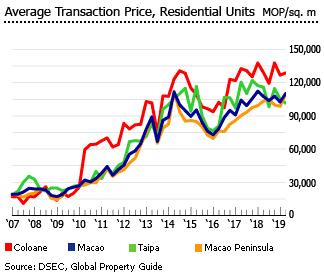
When the economy was in recession in 2015, house prices fell by 13% (-16.8% in real terms).
The economy grew by an annual average of 7.2% in 2017 and 2018, and this was reflected in the housing market. Residential property prices rose by 16.8% in 2017 and by 7.5% in 2018 (15.4% and 4.4% in real terms).
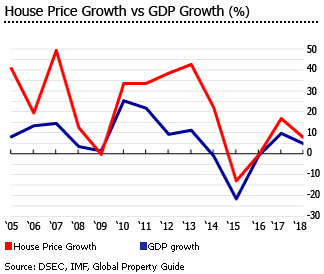
Demand is plunging
Residential property transactions in Macau plummeted by 38.6% y-o-y in the first half of 2019 to 4,104, according to DSEC. Likewise, total transaction values plunged 42.1% to MOP 25.22 billion (US$3.11 billion).
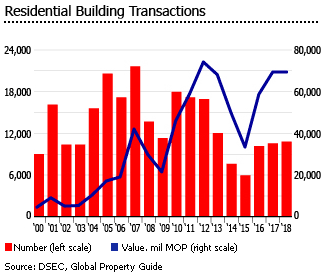
- In Macao Peninsula, the number of residential property transactions fell by 33% y-o-y in H1 2019 while transaction values were down by 32.6%.
- In Taipa, residential property transactions dropped 40% y-o-y in H1 2019 and transaction values fell by 48%.
- In Coloane, residential property transactions plunged by 65% during the year to H1 2019 while sales values were down by 63.7%.
Residential construction activity falling
Residential construction permits plummeted by 52% y-o-y in 2018 to 1,493 units. Residential building completions fell by 3.7%. Residential construction almost ground to a halt this year.
- Residential completions plunged 92% to just 104 in H1 2019, compared to 1,251 in H1 2018
- Residential permits dropped 86% to 134 in H1 2019, from 945 a year earlier.
There were 231,422 residential units in Macau in H1 2019, with 79% of them in Macao Peninsula.
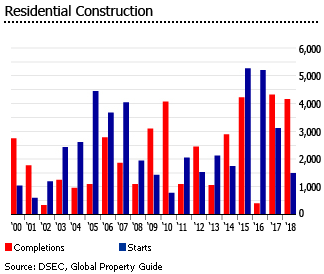
“Macau’s residential market is expected to face challenges in view of the very limited supply in the short, medium to long term,” said Gregory Ku of JLL Macau. “The government should proactively find ways to increase land supply and speed up the process of urbanization to prevent Macau’s property market from facing the dilemma of discontinuity of supply.”
Vacant units increasing
The number of vacant residential units continues to rise. In H1 2019, there were a total of 15,292 vacant residential units in Macau, up by 8.2% from a year earlier, according to DSEC. This is 6.6% of the total housing stock.
In 2018, the total number of vacant residential units rose by almost 15% from a year earlier, to 18,109 units – the highest level since 2004.
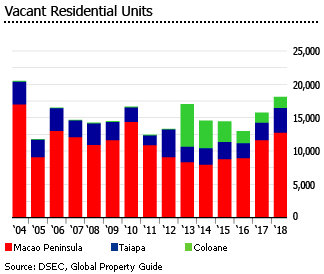
Residential mortgage loans plunging, despite falling key rate
In October 2019, the MACM lowered its key rate by 25 basis points to 2%, following its Hong Kong counterpart’s move. This was the third rate cut this year. The Macanese pataca (MOP) is linked to the Hong Kong dollar, which is also linked to the US dollar.
Despite this, new mortgage loans are falling sharply. In August 2019, the value of new residential mortgage loans (RMLs) approved fell by 44.1% to MOP 4.1 billion (US$506.27 million) from a year earlier, based on a recent central bank press release. New RMLs to residents accounted for more than 98% of the total new approvals while the remaining 2% were to non-residents.
Despite this, the total outstanding RMLs rose by 10.4% y-o-y to MOP 226.6 billion (US$27.97 billion) by end-August 2019, according to the Monetary Authority of Macao (AMCM). Of which, the resident component made up 93.3% of the total loans.
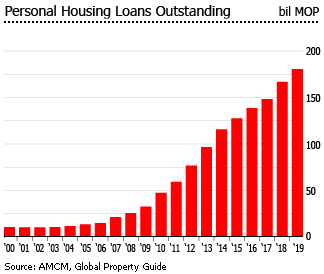
In May 2017, the government imposed loan-to-value (LTV) restrictions on housing purchases, in an effort to curb excessive demand. However in early-2018, the government partially eased its regulations to help young locals to buy their first home. The measure targets permanent residents aged between 21 and 44 years who currently do not own an apartment.
- Banks are now allowed to grant mortgage loans of up to 90% LTV for properties valued less than MOP 3.3 million (US$407,355). Though the total amount of loan should not exceed MOP 2.64 million (US$325,884).
- For apartments priced between MOP 3.3 million (US$407,355) and MOP 8 million (US$ 987,526), the maximum LTV is 80%.
- For mortgage loans intended to purchase properties under construction, the new LTV is 80% and the loan limit is set at MOP 6.4 million (US$ 790,021).
Gaming sector weakens
In the first three quarters of 2019, gross gaming revenue for Macau casino operators amounted to MOP 220.93 billion (US$27.27 billion), down by 1.8% from a year earlier, according to the Statistics and Census Service (DSEC). This was in sharp contrast to y-o-y growth of 14% in 2018 and 19% in 2017.
VIP gross gaming revenue fell by 22.5% y-o-y in Q3 2019. VIP gaming revenue accounts for about 44% of all casino gaming revenues.
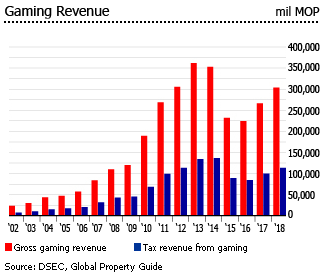
The weak performance of Macau’s gaming sector is attributable to the US-China trade dispute, the civil unrest in Hong Kong, and regulatory uncertainty over high-roller junkets.
About 60% of Macau’s economy depends on the gaming industry, and another 11% on related sectors like hotels, shops, and restaurants, according to economics professor Ricardo Siu of the University of Macau.
However, tourist arrivals are surging
In the first three quarters of 2019, the total number of visitor arrivals in Macau surged 17% to 30.2 million people from the same period last year, following annual growth of 9.8% in 2018 and 5.4% in 2017, according to the DSEC.
Tourism benefited from the recent opening of the Hong Kong-Zhuhai-Macau Bridge. About 71% of the visitors in the first three quarters of 2019 came from Mainland China.
From January to September 2019:
- By land: 22.37 million people, up 46.8% y-o-y
- By air: 2.88 million people, up 17.9% y-o-y
- By sea: 4.95 people, down 39.1% y-o-y
Visitors on package tours increased 15.1% to about 4.92 million people in the first half of 2019 from the same period last year. However the number of guests in hotels and guesthouses rose only by 1.5% y-o-y to 6.91 million people in the first half of 2019.
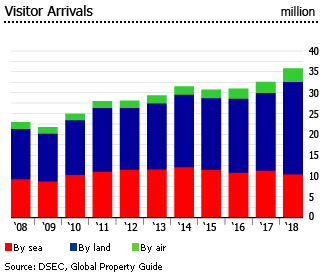
Macau could see a record 40 million tourist arrivals this year, according to Maria Helena de Senna Fernandes, the head of the Macao Government Tourism Office (MGTO).
As of August 2019, there were 119 hotels & guesthouses in Macau, up from 116 establishments a year earlier. The average occupancy rate in hotels and guesthouses was 93% in August 2019, down from 95.2% a year earlier.
Macau’s economy expected to slow
During the first half of this year, Macau´s economy contracted by a total of 2.5% from the same period last year.
After expanding by almost 17% per year from 2010 to 2013, Macau suffered a three-year slump in 2014-16 (with 2015 registering a whopping 21.6% decline), after its main industry - gaming activities - took a major hit from China’s anti-corruption campaign.
Fortunately, the economy bounced back strongly in 2017 and 2018, with GDP growth of 9.7% in 2017 and another 4.7% in 2018, buoyed by massive infrastructure investments and booming tourism.
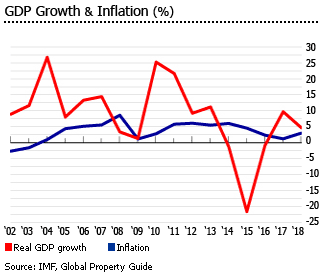
Macau’s economy is expected to contract by 1.3% this year and by another 1.1% in 2020, based on IMF estimates.
The unemployment rate was 1.8% in Q3 2019, unchanged from a year earlier.
In August 2019, Ho Iat Seng, former president of the Legislative Assembly, was elected Chief Executive of Macau, receiving 98% of the total votes (392 of the 400 members of the Electoral Commission). Ordinary citizens have no direct say in the appointment of their chief executive.
Increased connectivity to benefit tourism and the housing market
Macau´s long-term outlook remains positive, despite these issues.
Massive infrastructure developments are expected to benefit tourism and the housing market in the years to come. They include:
- The 200,000 sq. m. Taipa maritime terminal, which began operation in June 2017, is increasing travel between Macau and its neighbouring cities. It will also directly connect to the planned light rail transit system.
- Construction of the Gongbei tunnel to connect Zhuhai with the recently-completed Hong Kong-Zhuhai-Macau bridge started in April 2017.
- The Shenzhen-Zhongshan tunnel, scheduled for completion in 202, will reduce the average travel time between Shenzhen and Zhongshan from two hours to less than 30 minutes.
- Beijing is committed to a comprehensive Guangdong-Hong Kong-Macau Bay Area development plan to increase connectivity, trade and investment between the three regions.
"We believe these initiatives will enhance Macau’s competitive advantage, complement its ties to Guangdong province, stimulate economic growth, and pave the way for the city to become a point of connectivity between China and Portuguese-speaking countries," said MPO Fund.
Sources:
- Macau’s property market to remain stable in 2H19 amidst tight residential supply (JLL): https://www.jll.com.hk/en/newsroom/macau-mid-year-property-review-2019
- Mortgage loans statistics – August 2019 (Monetary Authority of Macao): https://www.amcm.gov.mo/files/research_and_stats/stats/advance_release_calendar/en/2019/mls_201908_en.pdf
- New measures to manage Macao’s residential property market (Macao SAR Government Portal): https://www.gov.mo/en/news/91024/
- Legislative Assembly passes measure on stamp duty for non-first-time buyers (Macau Business): https://www.macaubusiness.com/macau-legislative-assembly-passed-measure-stamp-duty-non-first-time-buyers/
- Gov’t eases mortgage loans for young locals (Macau Business): https://www.macaubusiness.com/macau-govt-eases-mortgage-loans-young-locals/
- World Economic Outlook Database (International Monetary Fund): https://www.imf.org/external/pubs/ft/weo/2019/02/weodata/index.aspx
- Macao’s Base Rate of the Discount Window Lowered to 2.0% (Monetary Authority of Macao): https://www.amcm.gov.mo/en/about-amcm/press-releases/gap/20191031-macaos-base-rate-lowered
- Mortgage loans statistics – August 2019 (Monetary Authority of Macao): https://www.amcm.gov.mo/en/about-amcm/press-releases/gee/mortgage-loans-statistics-august-2019
- Construction and real estate transactions (Statistics and Census Service): https://www.dsec.gov.mo/Statistic.aspx?lang=en-US&NodeGuid=d45bf8ce-2b35-45d9-ab3a-ed645e8af4bb#
- Macau Interest Rate (Trading Economics): https://tradingeconomics.com/macau/interest-rate
- Macau Gaming Revenue Slips For Sixth Time In 2019 (Card Player): https://www.cardplayer.com/poker-news/24416-macau-gaming-revenue-drops-for-sixth-time-in-2019
- Macau Gaming Revenue Touches the Lowest Level in a Year (Bloomberg): https://www.bloomberg.com/news/articles/2019-10-01/macau-casino-gaming-revenue-touches-the-lowest-level-in-a-year
- Macau could see 40 mln tourist arrivals in 2019: govt (GGR Asia): https://www.ggrasia.com/macau-could-see-40-mln-tourist-arrivals-in-2019-govt/
- Macau expected to return to economic growth in the second half of 2019 (Macau Hub): https://macauhub.com.mo/2019/09/13/pt-macau-devera-retomar-crescimento-economico-no-2-o-semestre-de-2019/
- Macau to end 2019 with an economic contraction of 1.3%, IMF says (Macau Hub): https://macauhub.com.mo/2019/10/17/pt-macau-encerrara-2019-com-uma-contraccao-economica-de-13-fmi/
- Macau GDP Annual Growth Rate (Trading Economics): https://tradingeconomics.com/macau/gdp-growth-annual
- Ho Iat Seng is the newly elected Chief Executive of Macau (Macau Hub): https://macauhub.com.mo/2019/08/26/pt-ho-iat-seng-e-o-novo-chefe-do-executivo-eleito-de-macau/